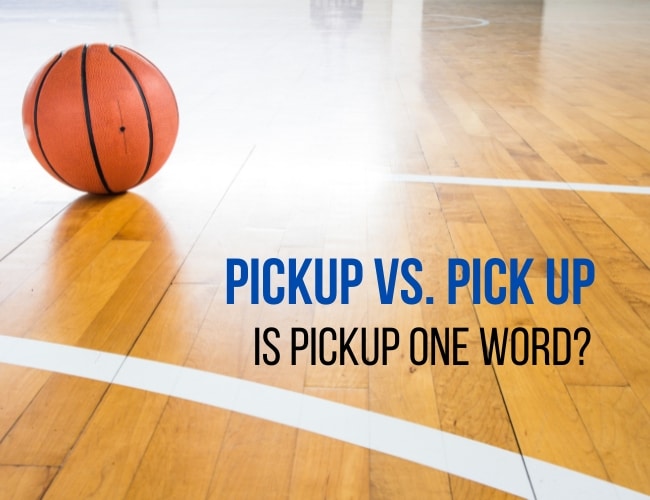It is a truth universally acknowledged that a term in possession of multiple forms is subject to confusion. (With apologies to Jane Austen.) One such tern is pick up vs. pickup vs. pick-up. Is pickup one word? Yes and no.

Definitions: pickup vs. pick up
Let's start by defining pick up and pickup. They are different.
Pick up is a phrasal verb. That simply means it takes more than one word to form the complete verb. The second word, often called a verbal complement, changes the meaning from the base verb. Most of the time, the verbal complement is an adverb or “preposition.”
Three examples of phrasal verbs are turn on/off (as opposed to turn), pick up/on (vs. pick), and see to (different from see). To check out how the additional word affects the meaning, think about the differences among the following sentences.
She turns on/off the light vs. She turns the light.
They pick up the child vs.They pick on the child vs. They pick the child.
Did you see to your guests? vs. Did you see your guests?
Pickup is a noun, i.e., the name of a person, place, thing or idea, or an adjective/modifier.
Pick-up is a disappearing alternative to pickup. The hyphen makes it a single word.
Why we get them confused
Many people have difficulty remembering whether the form they want to use is spelled as one word or two words. They are not ignorant or stupid. Spelling conventions are arbitrary and change over time, and we do not always keep up with the changes.
Compound terms often go through a combining process. They start our as two words, become hyphenated, and end up as single words. Your birthday was once your birth day, for example.
Different uses employ different forms, and the noun/adjective has a different form from the verb form. If it helps, the noun is a single word, just like its part of speech, and the phrasal verb is two words, also like its part of speech.
Easy, right?
Explanation of the term “pickup”
What is a pickup? The word has several meanings. It can refer to a truck, a kind of game, band equipment, or a person. Here are some examples.
Joe bought a new pickup (or pickup truck) last week.
We stayed late at the park playing a pickup game of soccer.
The guitar pickup malfunctioned, so no one heard Sonny's solo.
The hitchhiker proved to be a congenial pickup on the long drive.
Explanation of the term “pick up”
The verb “pick up” also has more than one definition. We start with the very literal meaning of grasping something and lifting it from the surface on which rests and then extend the meaning to mean acquire something (usually casually), including greater speed. Here are some examples.
Sarah picked up Chinese food for dinner.
David often picks up hitchhikers and gives them a ride.
John picked up the book at a yard sale.
Evelyn's shortwave radio can pick up broadcasts from around the world.
The bloodhounds picked up the scent, and the deputies picked up the fugitive.
The locomotive picked up speed on the straightaway.
Is pickup one word? A quick trick to remember
Here's a quick check for whether to write pickup or pick up. Can you put a word between the two parts? For example, If you see trash on the ground, pick it up! Two words.
Some final examples with the two forms:
While driving his pickup, Joe saw a hitchhiker and picked him up.
Do you want to pick up food after our pickup basketball game tomorrow?
Is that the best pickup line you have while we're waiting to pick up Thai food?
Want more tips to keep track of tricky words? Check out our post on ya'll vs. y'all here.
Do you have a trick you use to remember the difference between pickup and pick up? Share in the comments.
PRACTICE
Now it's your turn. Set your timer for 15 minutes. Write a short story using pickup and pick up, as well as similar terms like runaway/run away, takeout/take out, and workout/work out. When finished, share your practice in the Pro Practice Workshop and leave encouragement for a few other writers too!

Robert Harrell
Robert Harrell is a grammar nerd—and a language teacher, medieval re-creationist, musician, traveler, and theologian. His interests inform his stories and coaching. Published in German, Spanish, and French, with two English-language YA/NA series underway, Robert is pursuing The Write Practice Book Coach Certification to help other writers excel. Learn more at his website.



“Pickup” (truck) follows the same linguistic drift as a lot of other words, like “minivan,” which started as “mini van,” when Iaccoca introduced it in 1980, then became “mini-van” later in the 1980’s, and now is “minivan.” (Something to keep in mind if you’re writing historically.) So whether you use a hyphen or not may depend partially on how long the term’s been in the language.